December 31, 2025 | 10:44 GMT +7
December 31, 2025 | 10:44 GMT +7
Hotline: 0913.378.918
December 31, 2025 | 10:44 GMT +7
Hotline: 0913.378.918
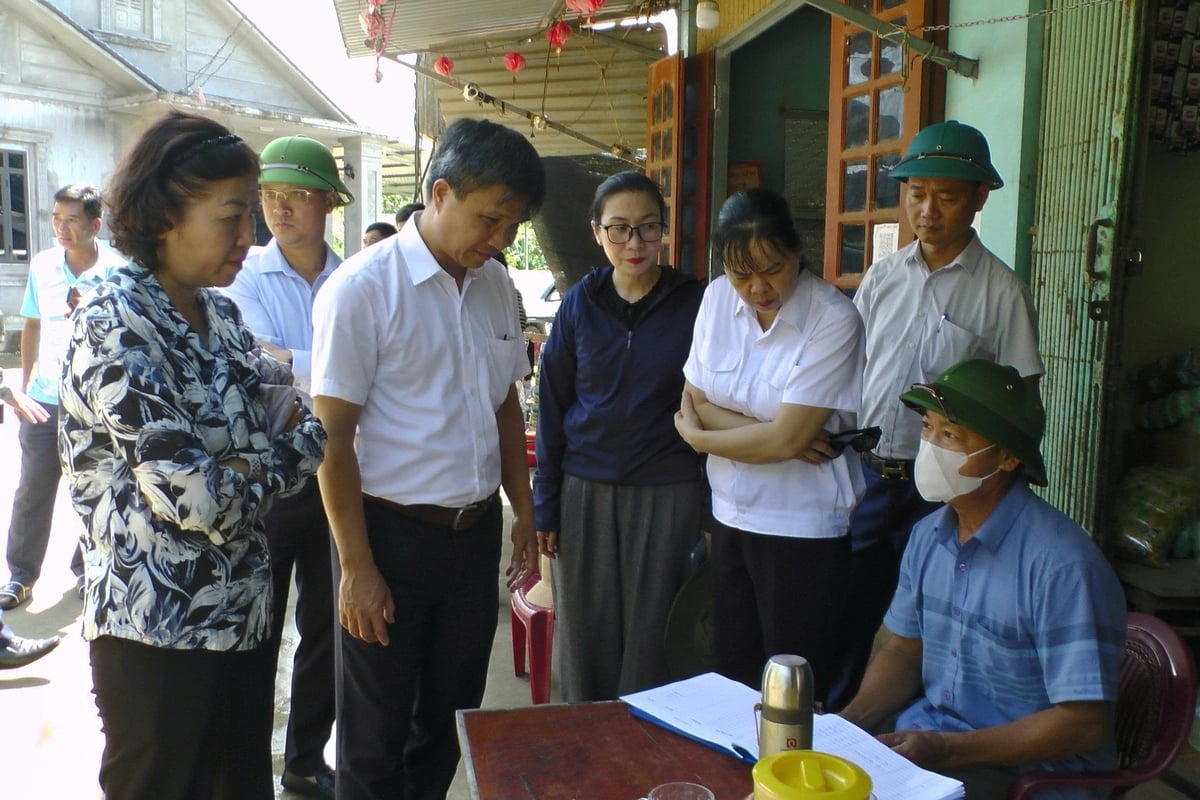
The working group from the Department of Livestock Production and Animal Health inspected African swine fever prevention work in Luong Thinh commune, Lao Cai province. Photo: Thanh Tien.
On August 1, the working delegation led by Nguyen Thu Thuy, Deputy Director of the Department of Livestock Production and Animal Health, inspected disease prevention and control work in Luong Thinh commune, an area where the number of new outbreaks is rapidly increasing.
The commune's report shows that from July 23 to 31, 145 pigs were infected, died and destroyed, resulting in a loss of nearly 8 tons. The outbreaks mainly occurred in Khang Chinh, Quang Vinh, Yen Phu and Luong Thien villages. So far, the commune has declared the epidemic in Khang Chinh and Quang Vinh villages.
“The commune has established two disease control checkpoints in Khang Chinh and Quang Vinh villages to guide the movement and transportation of animals and animal products through epidemic areas. Slaughtering, bringing in and taking out pigs in the declared epidemic areas are prohibited. Local veterinary forces carry out sanitation, disinfection and sterilization for all vehicles entering and leaving the epidemic areas, and the destruction of dead or sick pigs is carried out in accordance with regulations,” said Le Anh Tuan, Vice Chairman of the People's Committee of Luong Thinh commune.
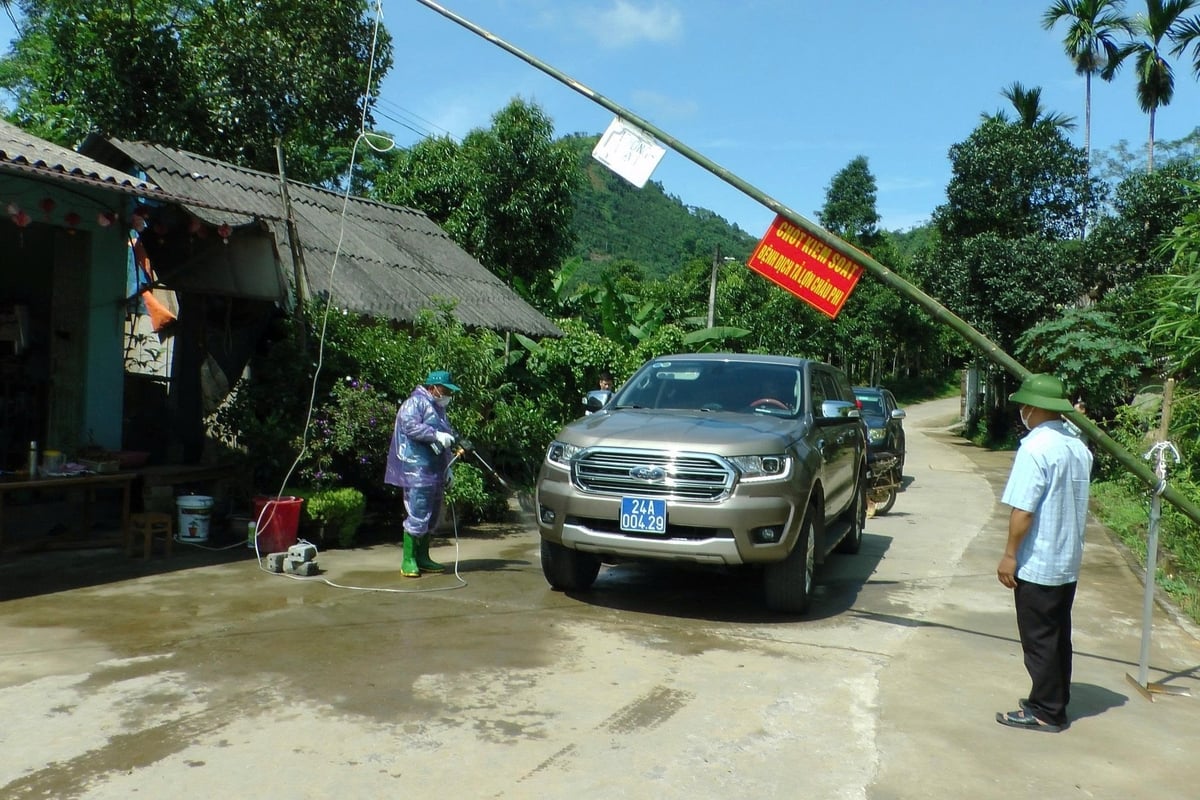
Luong Thinh commune has set up animal control checkpoints to control the flow of animals and animal products. Photo: Thanh Tien.
During the meeting, Nguyen Duc Dien, Deputy Director of Lao Cai Department of Agriculture and Environment, assessed that the African swine fever situation in the province was not yet at an urgent level, as most of the cases happened in small-scale farms. It was fortunate that people's awareness had been significantly improved, so they voluntarily applied basic biosecurity measures.
Lao Cai also showed proactiveness in approaching new scientific and technological solutions. A typical example was the coordination with businesses to test the African swine fever vaccine from early 2024. The successful results boosted the province's confidence and readiness in terms of using vaccines as a tool to protect livestock.
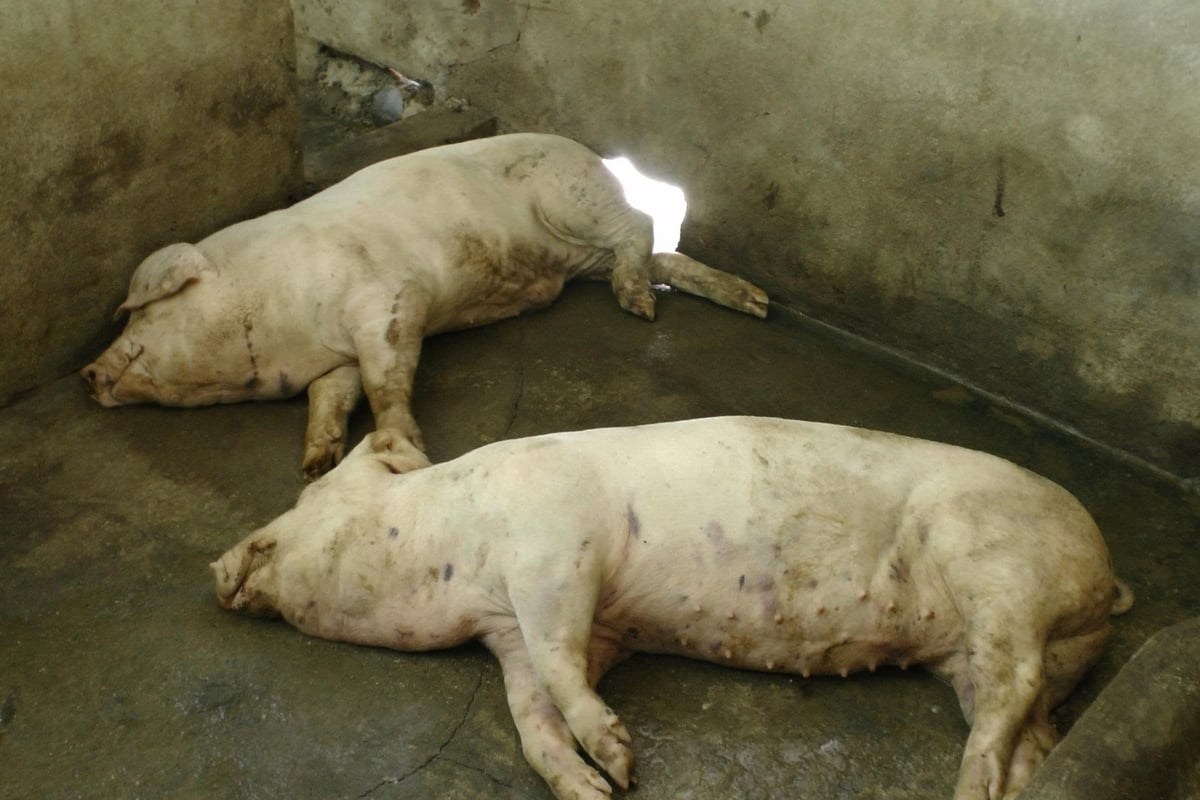
Pigs infected with African swine fever and dying in small-scale farms are still a common scene in localities. Photo: Thanh Tien.
The prerequisite of effective control for diseases that could spread rapidly, like African swine fever, was to organize synchronous vaccination campaigns instead of letting localities implement it in a fragmented and inconsistent manner. Analyzing this issue in depth, Deputy Director Nguyen Duc Dien pointed out the clear difference between the two approaches by taking the example of the province's practical experience in foot-and-mouth disease vaccination.
Lao Cai province had always organized two major campaigns, with clear start and end times (phase 1 ended on March 30, phase 2 ended on September 30). Vaccines were distributed simultaneously, and vaccination was carried out almost at the same time throughout the province. This approach created a strong community immunity "shield", minimizing epidemiological gaps for spreading pathogens.
On the contrary, when the task was delegated to the commune level, the epidemic prevention work would not be able to achieve the desired quality because the process of purchasing supplies and vaccines using the state budget was complicated.
If left on their own, even capable communes would still need 2 - 3 months to complete the task. Those with zero experience tended to struggle, and the process would take up to 3 - 4 months. Meanwhile, the transportation and circulation of livestock still took place; hence, some animals were vaccinated, and some were not, creating inconsistency and lowering the effectiveness of epidemic prevention work.
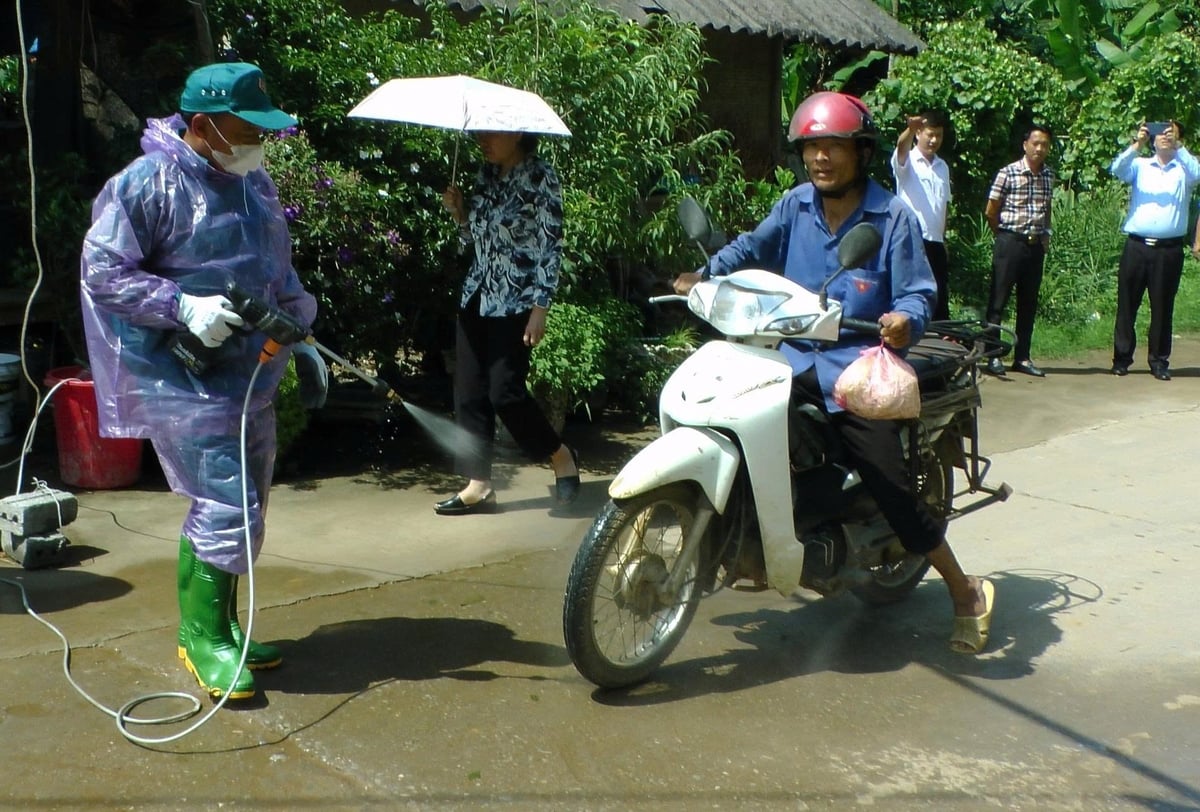
Local authorities spray disinfectant at quarantine checkpoints. Photo: Thanh Tien.
Deputy Director Dien recommended that the central government and ministries and branches thoroughly reevaluate decentralization in the veterinary field. To ensure consistency, the provincial management level must be responsible for clearly defining the tasks in organizing large-scale vaccination campaigns.
“The law must be constructed with keen details so that the provincial level gains the legal basis and resources. A campaign with unified command and implemented simultaneously would be much more effective than small, unconnected efforts,” said Deputy Director Nguyen Duc Dien.
Nguyen Thu Thuy, Deputy Director of the Department of Livestock Production and Animal Health, acknowledged Luong Thinh commune’s initiative in mobilizing local forces. “In order to provide timely direction, apply scientific measures and coordinate resources such as disinfectants and vaccines effectively, it is crucial to have a specialized veterinary agency located at the inter-commune level,” she said.
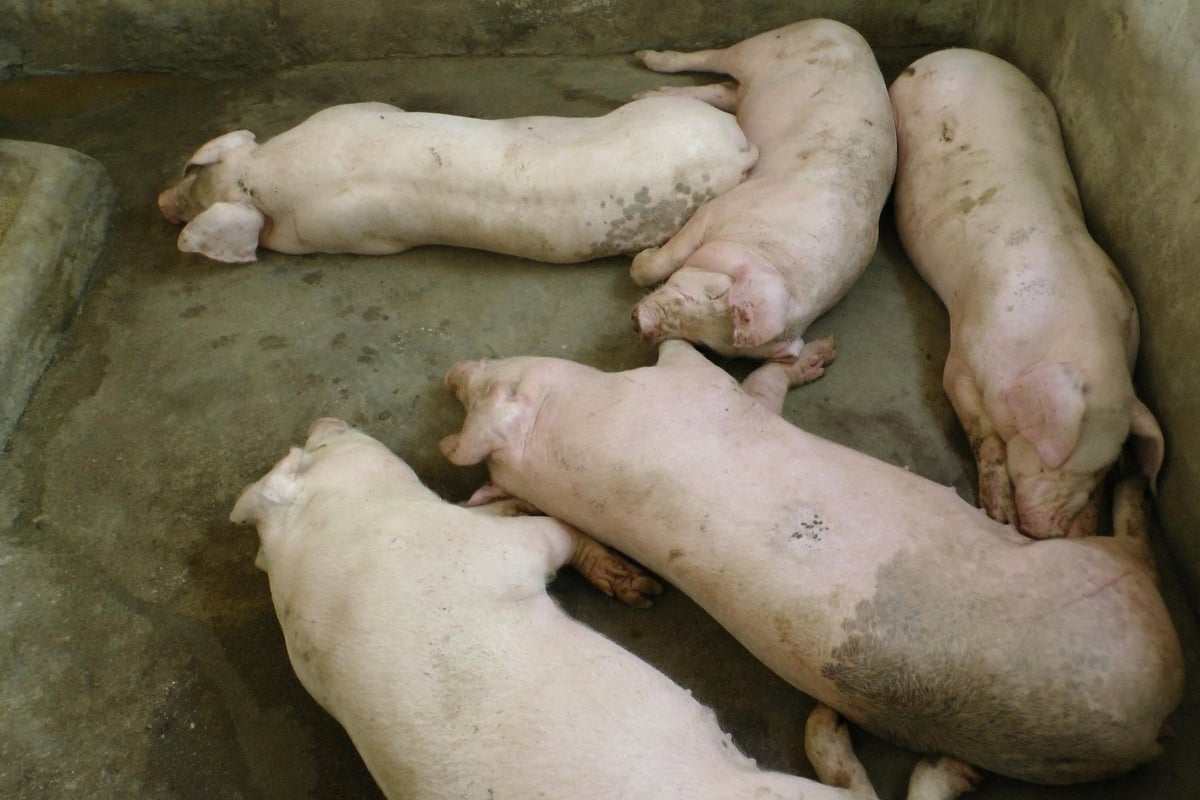
Synchronous vaccination is essential to protect livestock from African swine fever. Photo: Thanh Tien.
The current model of agricultural service stations mainly provides services and cannot perform state management functions. Deputy Director Nguyen Thu Thuy, therefore, proposed that the Lao Cai Department of Agriculture and Environment study ways to improve this model to prepare for the future challenges of tightening small-scale slaughtering and building concentrated slaughterhouses.
The implementation of national vaccination programs must be done by the province to unify the types of vaccines, ensuring that the vaccination process is carried out thoroughly and on time. The commune authorities should encourage farmers to apply biosecurity measures. Deputy Director Nguyen Thu Thuy also suggested that the province promote the application of information technology and digital transformation so that the direction of disease prevention and control in the 99 communes of Lao Cai province would be more effective.
Translated by Samuel Pham

(VAN) From extensive shrimp ponds, baskets of don gathered on the mudflats, to boats carrying visitors to watch birds, all livelihoods here depend on clean water, green forests, and the calls of migratory birds.
/2025/12/26/0703-3-204813_117.jpg)
(VAN) Transparency in information and listening to local people have helped address ground clearance bottlenecks and build social consensus, thereby accelerating the progress of the JICA3 irrigation project.
/2025/12/27/0609-3-233846_327.jpg)
(VAN) The JICA3 project is expected to become a 'water shield,' helping control saltwater intrusion, proactively secure water resources, protect livelihoods, and promote sustainable development in coastal areas.
/2025/12/26/5654-3-164509_655.jpg)
(VAN) As Viet Nam makes strong commitments toward achieving net-zero emissions, controlling and reducing methane emissions in livestock production is increasingly becoming a mandatory requirement.

(VAN) 'People, Primates, Plants: Co-managing Biodiversity and Improving Livelihoods in Vietnam' (the PPP Project) is an international initiative implemented in Vietnam by BGCI, CEGORN, and ICRAF/World Agroforestry.

(VAN) Dak Nong established a risk-level zoning map for coffee, built a digital data platform for the sector, and promoted certified production in line with EUDR.
/2025/12/25/2709-1-211551_295.jpg)
(VAN) In response to the U.S. Marine Mammal Protection Act (MMPA), Gia Lai province is implementing many solutions to protect marine mammals and develop sustainable, responsible fisheries.